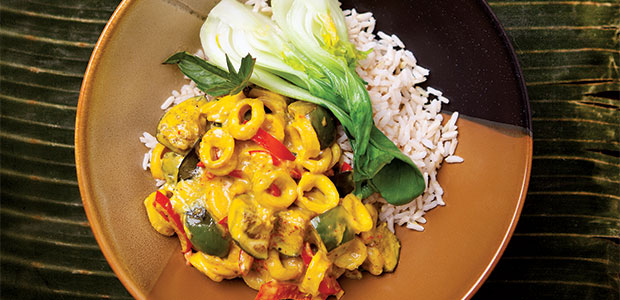Advertisement
Stir-Up Delicious Thai Food
Enjoy a feast of flavour

All over Thailand, a profusion of sweet, sour, salty, and fiery food is served in large open-air complexes and under the night sky along city streets. Fresh and complex, Thai street food is among the world’s most celebrated cuisines. Most often, dishes such as papaya salad and noodle soups are prepared in front of your eyes using inspired local ingredients.
So it’s a shame the offerings at most restaurants on this side of the Pacific are so poorly thought out. Really, ketchup in pad Thai? Well, put down that takeout menu. Homemade Thai food can be not only more authentic tasting, but also healthier and much easier to prepare than you think.
Recipes
- Yellow Squid Curry
- Coconut Custard (Sangkaya) with Black Rice Pudding (Kao Niew Dum)
- Chicken Satay with Sweet and Sour Dipping Sauce
- Papaya Salad (Som Tam)
- Authentic Pad Thai
- Morning Market Noodle Soup (Pho)
The Thai pantry
A Thai or Chinese grocery store is the ideal place to stock up on Thai cooking essentials such as these.
Bird’s eye chili
Peppers that come fresh or dried. Smaller ones, particularly the red peppers, are fierier than larger peppers.
Galangal
A rhizome similar in texture to ginger, but slightly more pungent.
Fish sauce
Made from anchovy-like fish, it’s the main item Thai cooks use to salt their dishes. It also adds savoury flavour.
Palm sugar
A granulated brown coloured sugar most often made from the sap of coconut trees. It has a slight caramel flavour. Most health food stores now carry coconut sugar, and some Asian markets sell palm sugar in blocks that are meant to be shaved before use.
Tamarind
A fruit often sold as a pulpy cake and used as a souring agent. Pieces of pulp are soaked in hot water and then strained through a sieve, leaving you with dark sour water.
Thai basil
Has purplish stems, green leaves, and a slight aniseed taste.
Thai eggplant
Golf ball-sized eggplants that are slightly bitter tasting (less so once cooked). Most often used in curries.
Turkey power
We often suggest organic, free-range chicken breast as a good source of lean protein after a workout. Why not switch it up a bit with turkey in this Morning Market Noodle Soup? A 100 gram serving of cooked turkey breast meat contains a mere 135 calories and 1 gram of total fat but a whopping 30 grams of muscle-building protein. Turkey also contains high levels of B vitamins, which are important for releasing energy in the body, keeping red blood cells healthy, and building and repairing body tissues—a necessity after a sweat-inducing workout.
We often suggest organic, free-range chicken breast as a good source of lean protein after a workout. Why not switch it up a bit with turkey in this Morning Market Noodle Soup? A 100 gram serving of cooked turkey breast meat contains a mere 135 calories and 1 gram of total fat but a whopping 30 grams of muscle-building protein. Turkey also contains high levels of B vitamins, which are important for releasing energy in the body, keeping red blood cells healthy, and building and repairing body tissues—a necessity after a sweat-inducing workout.





